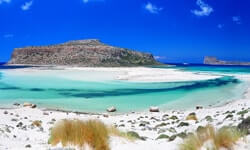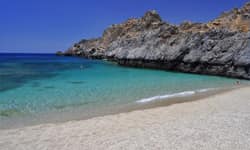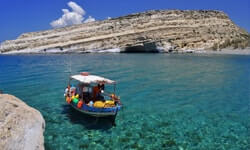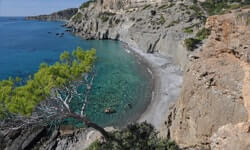From the dunes of Lafonissi and Xerokambos to the tropical shores of Kedrodasos and Chrissi, from the hidden beaches in the wild gorges of Sfakia and Asteroussia to the emerald bays of Triopetra and Plakias, from Balos and Elounda lagoons to the palm groves of Preveli and Vai, from piney beaches of Ierapetra to the long organized strands of the northern coasts, Crete offers the ultimate combination of carefree holidays and natural beauty, which can be finely reflected on its beaches.

Psalidia means scissors in Greek and this name is taken after the shape of the bay. The surrounding area is very dry and is cover by low sand dunes and shrubs, but in September it turns to a paradise by thousands of white sand lilies. Moreover, if you walk to Lagada, you’ll meet many amazing rocks that are ideal for shooting photos.
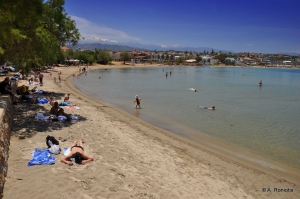
Glaros Beach is located 5 kilometers west of Chania city and is the coastal front of the village Kato Daratsos in the province of Kidonia and in the area of Makris Tihos. The beach is bounded to the west by Kalamaki and to the east by the beaches of Agii Apostoli.
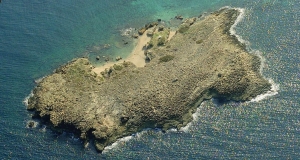
The main beach of Nea Chora is very well organized, with several amenities nearby. It is a nice sandy beach, with rocks in some places. Nea Chora is ideal for those that do not want to leave the city centre.

Because the sea in the area of Papadiokambos is often wavy, there is an excellent alternative for swimming east of the settlement, on the east side of the peninsula Trahili. The short cape blocks the waves and the waters are almost always calm and azure blue. However, at a first glance you will think that there is no beach,

The longest beach at Koufonissi lies in the southeast part of the islet, overlooking Africa! Amazing clean water, rocky seabed ideal for snorkeling, and smooth sand ideal for playing beach tennis. The only problem is the lack of shade.

The beach can be mainly accessed by boat, as it is hard to find the beach in the complicated dirt road network of the area. The beach is surrounded by low vegetation.

Between Platani and the airport of Sitia there are huge uninhabited lands with low vegetation and wild sharp rocks, where even no roads exist. This area, called Melissokipi (aka Bee gardens), is crossed by several deep streams flowing into the sea (in winter). One of them, Vathys Potamos (i.e. Deep River) a small sandy beach is formed which unfortunately is strongly affected by the frequent winds.

West of Mochlos and east of Malavra springs, you’ll see the plaster mines of the area. The site is called Altsi from the Turkish word alçı, which means gypsum, plaster. This region hosts two small beaches, totally unknown to everybody, as it is not accessed due to the mines. Access to the beaches of Altsi is possible via the road leading to the mills that grind the stones (the paved road signed as a dead end before Mochlos).





